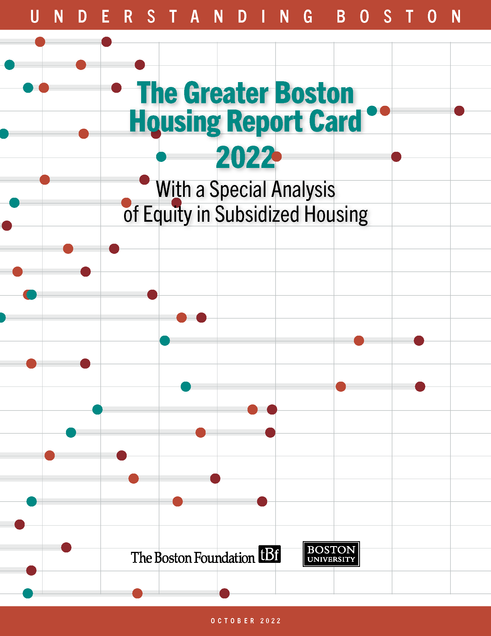The 2022 Greater Boston Housing Report Card
IOC Faculty Fellows Co-Author This Year’s Special Topic and Highlight Systemic Issues in Subsidized Housing
Greater Boston continues to struggle with a lack of affordable housing, as tight inventory and rising costs continue to place significant burdens on homebuyers and renters. At the same time, flaws in the systems around subsidized housing mean that thousands of people who qualify for subsidies are getting lost in a fragmented system that is difficult to navigate. 
Those are the major findings from The Boston Foundation’s Greater Boston Housing Report Card 2022, which was released today, October 26, 2022. The report card comprises three parts: a look at the current state of the market authored by Boston Indicators; a special analysis of equity in subsided housing co-authored by BU Initiative on Cities Faculty Fellows, Katherine Levine Einstein and Maxwell Palmer; and an accompanying series of interactive data and insights.
In Part II of the Report Card, Professors Einstein and Palmer explore equity in subsidized housing and find a system that challenges homeseekers to navigate fragmented information and application systems, outreach that often misses those most in need of subsidized housing, and obstacles at the local level that can disqualify homeseekers.
They found three major types of barriers:
Fragmentation of Information: Information about subsidized housing in Massachusetts is deeply fragmented across multiple units of government and nonprofits. The absence of complete, centralized databases means that residents of one city or town are often entirely unaware of available units in a neighboring community.
Compounding the lack of comprehensive listings, Einstein and Palmer examined the “affirmative marketing plans” for affordable units within several suburban developments and found that those plans often failed to share information with agencies in nearby cities and towns that would be most likely to have potential applicants.
Fragmented Application Process: Each jurisdiction—and sometimes each development—comes with its own complex application process. This administrative burden creates a formidable obstacle to the region’s subsidized housing seekers.
Exclusionary Restrictions: Suburban subsidized housing is often exclusionary on several dimensions. It can be restricted to residents of a suburban jurisdiction through the use of local preferences. Moreover, it is often too expensive for many low-income households. It is frequently located in transit inaccessible locations, creating impossible commutes for households lacking vehicles.
“These barriers in concert create a system that makes it difficult – if not impossible – for homeseekers to access subsidized units,” said Einstein. “With a new Governor coming to Beacon Hill, there is also a unique opportunity to implement meaningful policy changes that could improve information and application systems, eliminate unnecessary restrictions and open the door for more affordable, transit-accessible housing.”
The report concludes with ten policy recommendations to spark greater access and opportunity for homeseekers, including the creation of a new Massachusetts Office of Fair Housing, improved enforcement of fair housing laws and regulations, and the creation of better systems and oversight of housing data statewide. The report also recommends reducing restrictive covenants, such as age restrictions and local preferences, and reinforcing or encouraging regulations to allow for greater construction of all housing types.
Read the 2022 Greater Boston Housing Report Card